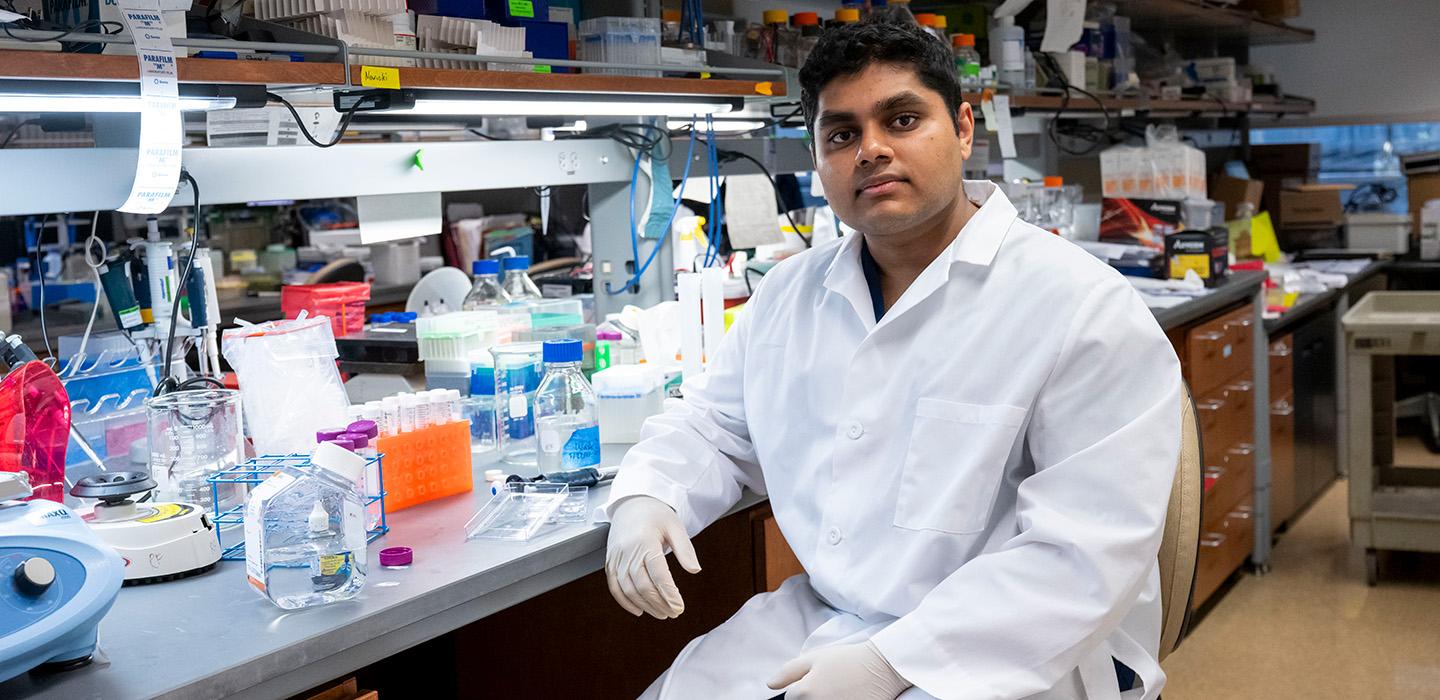
Subscribe to Pittwire Today
Get the most interesting and important stories from the University of Pittsburgh.Rohit Mantena sits beside a hospital bed, where a patient who’s suffered an aneurysm is about to enter surgery. He tells the patient that the Cerebral Aneurysm Research Lab, where Mantena studies and works, is researching new ways to detect and diagnose the ailment — and that with the patient’s consent, their blood sample could help inform the future of neurosurgery.
Mantena has made this human-to-human connection with many patients alongside the lab’s principal investigator, Kamil Nowicki. The patients who offer their samples have all undergone the long, taxing process of aneurysm treatment, and according to Mantena, they are often emotional and hopeful that their participation might make it easier for others with their condition.
“Moments like that were really impactful and motivated us to continue,” said Mantena, a senior biological sciences major in the Kenneth P. Dietrich School of Arts and Sciences. The work collecting blood samples “wasn’t something where you just publish it in a journal, and it just disappears. It was something that really sticks and has an impact.”
Originally from New Jersey, Mantena interviewed to attend the School of Medicine when he was a senior in high school, drawn to Pitt because of its strength in the health sciences. He’s now halfway through the University’s eight-year BS/MD program.
Though Pitt was the farthest school from his home — a six-hour drive from his family on the coast — he couldn’t pass up the opportunities the University provides for biomedical research, which he’s been passionate about since high school. His Pitt experience, including the access to UPMC, has confirmed to Mantena that he made the right decision.
But his most impactful experience at Pitt has been the Cerebral Aneurysm Research Lab, which he applied to before he even began his first semester. He said the connections he’s built with Nowicki, the lab’s PI; Robert Friedlander, chair of UPMC’s Department of Neurological Surgery; and his labmate Adi Mittal have made Pitt a place where he can spend hours in a lab each day and enjoy every second.
Along with his work in the lab, Mantena has won first and second place in separate years in Pitt’s Big Idea Competition for his teams’ inventions in nasal endoscopy and neurosurgery. He worked on the project for which Nowicki was named the American Academy of Neurological Surgery’s 2023 Academy Award winner. Mantena has also contributed to multiple peer-reviewed publications even before starting his term at the School of Medicine.
As he prepares to graduate, Mantena’s getting an extra helping hand from Pitt’s Panthers Forward program, which provides senior undergraduates with up to $5,000 in student loan relief. For Mantena, the program means he can spend more time working to advance healing and less time worrying about debt.
Panthers Forward has not only helped Mantena tackle some student loans, but it has also provided mentorship and financial planning advice to help him tackle any remaining debt and plan for success after graduation. In keeping with the program’s mission, Mantena will pay it forward by mentoring future Panthers Forward classes until he can make monetary donations of his own.
Mantena graduates from the Dietrich School in May and still has a long road ahead before he leaves the School of Medicine with his MD in 2030.
Until then, he will continue pouring hours into the lab he’s loved since he first stepped foot on campus. As he prepares cytokine array test kits, measures blood samples for molecules linked to inflammation and laughs through the day with his co-workers, Mantena is glad to know that, as a Pitt grad student, the people he works with and admires will still be right by his side.
Photography by Tom Altany


